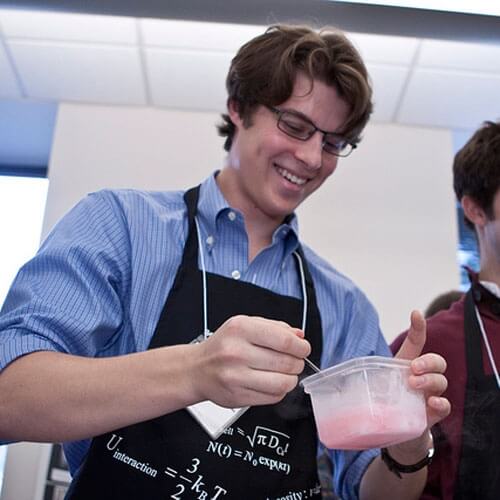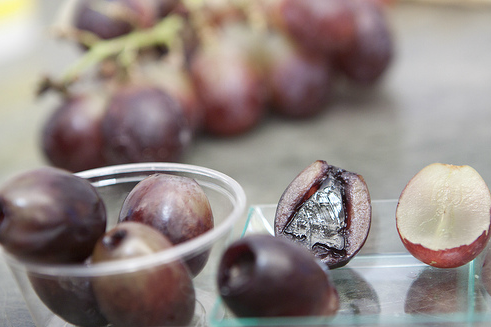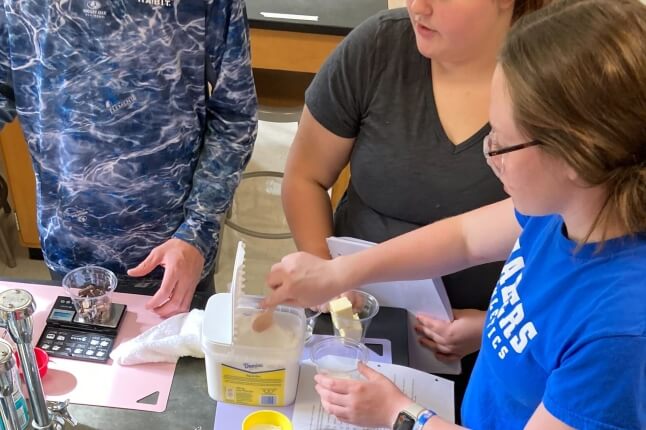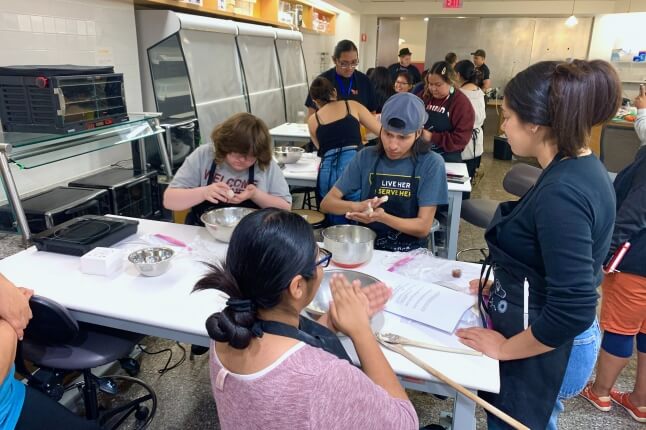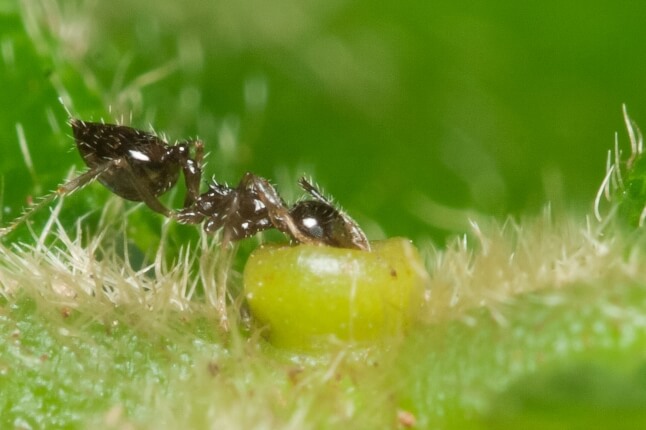News
Peter Boehm, John Randal Tyson, and Brian Butler developed a non-liquid rum-and-coke cocktail, winning the award for "most creative project."
Tofu pâté, sinking ice, and all-egg noodles replaced the usual fare in the Annenberg dining hall yesterday, at the second incarnation of Harvard's most delicious science fair.
The annual Science & Cooking Fair shows off students' final projects from the undergraduate, general-education course "Science & Cooking: From Haute Cuisine to the Science of Soft Matter."
This year, 63 teams presented a great variety of culinary creations. Chris Lehman '13 (social studies), and James Danner '13 (history and literature) attempted to recreate the texture, flavor, and acidity of a fresh raspberry in a spherified liquid form. Their classmate, Paul VanKoughnett '12 (mathematics), optimized the bubbliness of angel food cake. Most of the students who take the course do not intend to concentrate in science or engineering.
The Science & Cooking course brings world-famous, innovative chefs to Harvard to give guest lectures on specific aspects of scientific theory and culinary practice. (A separate series of public lectures is available online.)
Through the chefs' demonstrations of sweet treats like chocolate mousse and savory staples like steaks, students learn about colloids, rheology, and heat transfer. They then apply that knowledge in lab activities throughout the term and share their final projects with members of the Harvard community who can see a semester's worth of learning and, in most cases, taste the results.
"The projects are great," said course instructor David Weitz, the Mallinckrodt Professor of Physics and Applied Physics at Harvard's School of Engineering and Applied Sciences (SEAS). "We're convincing people who are not necessarily motivated to study science to actually enjoy it, and that's what I call success."
"They're also learning to ask scientific questions, and none of them are afraid of equations now," he added. "In fact, they cheer every time they see the equation of the week."
Many of the guest chefs returned to serve as judges at the Science & Cooking Fair. The top award, for "most creative project," was presented by acclaimed chef Ferran Adrià to a team that produced a non-liquid rum-and-coke cocktail in two phases. A few of the other awards included:
- Most delicious—Variations on an olive oil gelée
- Most entertaining—Levitating spheres of chocolate foam
- Most systematic—The science of pancakes
- Best project involving emulsification—Using garlic as a surfactant
- Best potential for business applications—Analysis of the effects of brewing method and caffeination on coffee emulsions
The difference between the final projects and the work done in the lab during the semester, said Weitz, is that "nobody knows what the results are before they start doing the project."
"That's what real research is about," he explained. "The point is to have them informed as citizens, if they're not scientists—to have them appreciate what science is about."
Complete list of Science & Cooking project winners
Prize Title | Student Names | Project Name | TF |
Most creative culinary prize | Peter Boehm, John Randal Tyson, Brian Butler | The Non-Liquid Rum and Coke - The "Two-Phase" | Steve Hershman |
Most entertaining project | Julia Mitelman, Melissa Niu, Catherine Kistler | Levitating Spheres of Chocolate Foam | Matt Barr |
Best use of hydrocolloids | Brent Suter, Georgia Stasinopoulos, Ruo Chen | Gel-Ice: manipulating crosslink length in frozen iota gel to manufacture a better cooling agent and flavor release in beverages | Dilani Kahawala |
Best emulsification project | Joshua Allen, Benjamin Sobel | Garlic as Surfactant: Emulsions and Interface Stabilization | Matt Barr |
Best baking project | Alexander Sareyan, Brian Mwarania, Edgar Orozco | Molten Chocolate Foam Cake: The Effect of Aeration on Heat Diffusion | Naveen Sinha |
Best potential business application | Jesse Kaplan, Chandan Lodha, Natalie Padilla | Brewed Awakening: An Analysis of the Effects of Brewing Method and Caffeination on Coffee Emulsions | Matt Barr |
Most creative culinary prize | Peter Boehm, John Randal Tyson, Brian Butler | The Non-Liquid Rum and Coke - The "Two-Phase" | Steve Hershman |
Best project on spherification | Sarah Stein Lubrano, Madeline Magnuson, Andrew Murray | Spherifying Foams | Risa Kawai |
Most delicious project | Elizabeth Horton, Ariana Baurley, Tom Foley | Variations on the Olive Oil Gelee: Recipe Ratio Adjustments and Molecular Structure | Helen Wu |
Most resourceful use of tools in lab | Jacob Drucker, Ron Serko, Sam Peinado | Wine Grapes: Gelation of Alcohol and Fruit Elasticity | Helen Wu |
Best transglutaminase project | Claire Flintoff, Gabrielle Ehrlich, Nicholas Galat | Vegetarian Proteins and Transglutaminase Applications | John McGee |
Most elegant simple experiment | Alex Brennin, Saieed Hasnoo, Miguel Cutiongco | Preventing Oxidation with Kitchen-Available Solutions | Anna Wang |
Best application of theory | William Marks | Predicting Temperature of Chocolate Mousse without Air-ror | Matt Barr |
Coolest project | Mariana Ramirez de Arellano, Michael Rizzo, Gavin Pascarella | Sinking Ice | Sorell Massenburg |
Most creative use of rheology | Christopher White, Natalie Sandman | The conditions for optimal tenderness of meat | Steve Hershman |
Least opaque project | Jeffrey Wilsey, George Hageman, Daniel Reichert | Transparent Treats: The Optics of Emulsions | Naveen Sinha |
Most scientifically rigorous use of alcohol | Amy Vo, Emelyn Rude, Jane Chun | Alcoholic Foams | Naveen Sinha |
Most comprehensive use of rheology | Julia Hu, Dona Ho, Suzi Lu | Perfecting Ricotta Cheese | Dilani Kahawala |
Most systematic project | Austin Glamser, Melody Wu, Zuzanna Wojcieszak | The Science of Pancakes | Helen Wu |
Best rheology of dessert | Peter Knudson, Milo Tong, Stanley Zheng | Italian Meringue Buttercream: Temperatures and Fruits | Dilani Kahawala |
Best gelation of Alcohol | Peter Truog, Adrienne Lee, Audrey Anderson | Elasticity, Alcohol, and Hydrocolloids | Sorell Massenburg |
Best improvement of traditional recipe | Mikhaila Fogel, Bobby Samuels, Sietse Goffard | The Science of Matzo Balls | Aileen Li |
Best vegetarian fast food | Karen Ding, Peter Chen, Weina Zhao | Tofu Faux Gras | Aileen Li |
Topics: Cooking
Cutting-edge science delivered direct to your inbox.
Join the Harvard SEAS mailing list.
